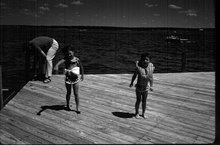
“But History is a memory fabricated according to positive formulas, a pure intellectual discourse which abolishes mythic Time; and a Photograph is a certain but fugitive testimony; so that everything today prepares our race for this impotence: to be no longer able to conceive duration, affectively or symbolically; the age of the Photograph is also the age of revolutions, contestations, assassinations, explosions, in short, of impatience, of everything which denies ripening--And no doubt the astonishment of ‘that-has been’ will also disappear. It has already disappeared: I am, I don’t know why, one of its last witnesses (a witness of the Inactual), and this book is its archaic trace.” --Barthes, Camera Lucida
I am not unaware of the irony inherent in my own narrative, the pitting of time against presence and the adopting of two media, two conveyances (writing and photograph) as means of perpetual impediment, of the impossibility of true conveyance for the merely poetic --perpetual deferment, rather than actual deliverance, not ever “a bridge to the Real, a scaffolding to be discarded.”
Perhaps I can invoke the mythos of landscape in my defense, of coming of age in a place where, as Adrienne Rich writes, “drought is the epic.” Or in Sudek’s ineffable words, “What would I be looking for when I did not find what I wanted to find?” When my grandfather became a physical absence, he only intensified in presence, and this Derridian notion was arrived at intuitively, through, if you will, the “concrete” experience of desolation. I was an archaeologist before I ever knew I was engaged in a project of collecting, of redeeming through artifacts what had been lost psychically, but what remained in some physical embodiment, if only as vestige, as ruin.
But what am I hoping to piece together from the fragments--evidence of love? The angle of incidence, the moment captured in an image--can these ever be evidence of anything other than the limited information they literally contain? When I return to the Caprock to visit my mother and grandmother, they are intrigued by my project, and willingly offer what scraps of history they can to elucidate my narrative. Most recently by grandmother told me the story of her first “date” with my grandfather, accompanied, of course, by his father. The two men launched into a lengthy and highly speculative discussion of astronomy, while my grandmother sat nearby, alienated on the mere Earth. They shared a bedroom only briefly. I never, not once, saw them touch. My last memory of my grandfather was his furious refusal to go to the hospital when his body started the rapid descent toward death. I could not cry.



